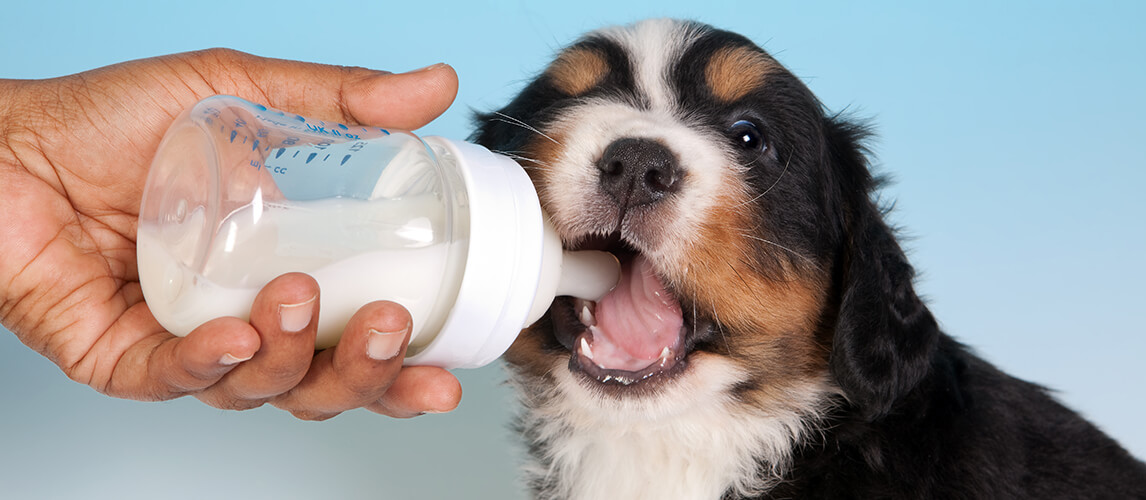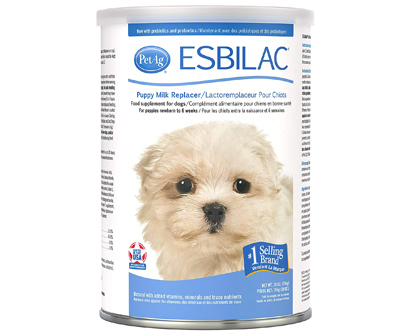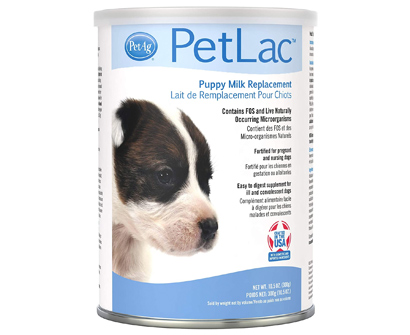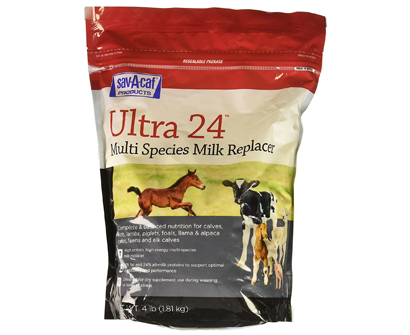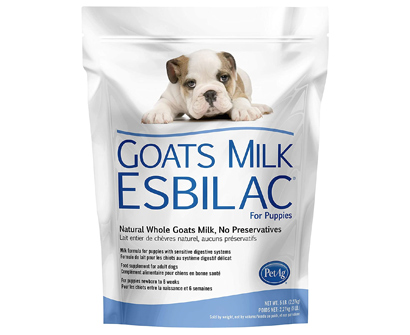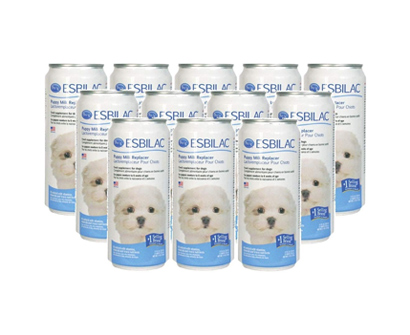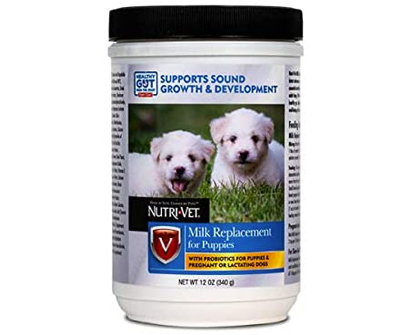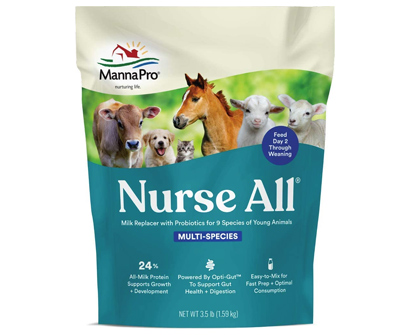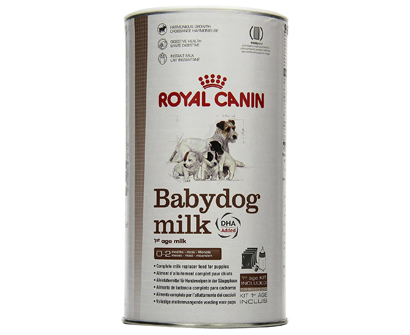- The Best Puppy Milk Replacer
- 1. PetAg Esbilac Puppy Milk Replacer
- 2. PetAg Petlac Puppy Milk Replacement
- 3. Sav A Caf Ultra 24 Multi Species Milk Replacer
- 4. PetAg Goat’S Milk Esbilac
- 5. PetAg Esbilac Liquid Puppy Milk Replacer
- 6. Nutri-Vet Milk Replacement For Puppies
- 7. Manna Pro Nurse All
- 8. Royal Canin Babydog Milk
In an ideal world, all puppies would drink their mother's milk every day until they were ready to make the transition onto the solid dog food. The initial milk (called colostrum) boosts the immune system and delivers exactly the right nutrients and antibodies that puppies need to fight off disease and become strong and healthy. Sadly, not all pups get enough or even any milk from the mom dog, whether because they're orphaned or because the mother is not able to nurse them. In order for the pups to survive, you have to feed them puppy milk replacers which are specially designed the mimic the mama dog's milk.
Milk replacers come in both powder and liquid formulas, but regardless of their form they offer a high protein and fat content to give your tiny fur baby loads of energy. It is vital that you select a milk product that is appropriate for your pup, so to help get you started, here are our reviews of the best puppy milk replacers plus a comprehensive buying guide.
The Best Puppy Milk Replacer
1. PetAg Esbilac Puppy Milk Replacer
Key Features
Plenty of energy – 900 kcal per kg
Delivers 33% protein and 40% fat
Contains cultures of Lactobacillus casei
Fortified with vitamins and minerals
Specifically formulated to satisfy all nutritional needs of puppies newborn to 6 weeks of age, this milk replacer is nutritionally dense and very easy to digest. It comes as a powder that is simple to make up into milk using water, so it’s long-lasting and ideal for large litters. The recipe features vegetable oils mixed with dried cream and milk, plus all the necessary vitamins and minerals. With 900 kcal per kg, it gives your pups all the valuable energy, protein and fat that they need to grow, develop, explore and play.
The protein content of Esbilac puppy milk replacer is 33 percent with a fat content of 40 percent. There are also added friendly bacteria (Lactobacillus casei) which aid in nutrient absorption, making sure your puppies cope with the formula well. The same bacteria also help improve puppies’ gut health and immune system, which is crucial for the first few weeks of their life. Importantly, the formula is also highly palatable so your pups are sure to lap it up! .
2. PetAg Petlac Puppy Milk Replacement
Key Features
Contains 29% protein and 28% of fat
Provides 858 kilocalories for every kg
Vitamins, minerals, FOS and live microorganisms
Can be used for pregnant and nursing dogs too
This puppy milk formula provides a growing pup with 29 percent of protein and 28 percent of fat, plus 2mg of iodine in every kg of the milk. Nicely balanced, this milk replacement is easy on the tummy and can even be used as a nutritional supplement for pregnant dogs or those that are feeding pups.
The formula is also enriched with important vitamins and minerals and contains Lactobacillus fermentum, which are naturally occurring microorganisms that help in digestion. Fed on this newborn puppy milk, your pups will get 858 kilocalories for every kg that they digest, so they should have plenty of energy. Since this is a powder formula that you have to mix warm water to create milk, it’s budget-friendly and long-lasting – always a nice plus!
3. Sav A Caf Ultra 24 Multi Species Milk Replacer
Key Features
Contains 24% protein and 24% fat
Multi-purpose formula can be used for other animals
Enriched with minerals and vitamins
Contains coconut oil
While not specifically designed for puppies, this generic milk replacer by Sav A Caf makes for a great puppy supplement as it’s very nutritious and high in calories. The formula has a high protein content (24 percent) that is made up of solely milk proteins for proper muscle development. There is also a high fat content (24 percent), thanks to animal fat and coconut oil, which will provide your pupper with plenty of energy.
The formula also contains vitamins and minerals including selenium, zinc and Vitamins A and E to provide tiny animals with all-important micronutrients. Aside from puppies, you can use it for calves, lambs, baby pigs and more, making it perfect for multi-pet households.
4. PetAg Goat’S Milk Esbilac
Key Features
Contains 900kcal per kg
33% protein and 40% fat
Fortified with vitamins and minerals
Easy to digest, highly nutritious
Suitable for convalescing dogs
Many experts believe that goat’s milk matches the milk produced by dogs the most closely. Easily digestible, super-nutritious and highly palatable, Goat’s Milk by Esbilac is, without a doubt, one of the best puppy milk replacers available on the market.
The 900 kcal per kg puppy formula comes with 33 percent of protein and 40 percent of fat , so it’s ideal for puppies newborn and up to six weeks old who need proper nutrition for growth and development. You can also use it for supplementing the diet of ill dogs and animals that are convalescing after surgery or after an illness.
5. PetAg Esbilac Liquid Puppy Milk Replacer
Key Features
Liquid milk in 11-ounce cans
4.5% protein and 6% fat per can
Enriched with vitamins and minerals
Easy to digest, highly palatable formula
If you don’t want to bother with mixing milk powder with water, a liquid puppy milk replacer such as PetAg Esbilac is a fantastic option. This formula comes in ready-to-feed 11ounce cans so it’s super-simple to use. You can use it as a supplement for newborn puppies until they reach the age of six weeks, as well as adult dogs who cannot eat properly due to illness or surgery as it’s nutritious but easy to digest.
The milk formula is packed with protein, fat and vitamins and minerals so your pup will be able to develop and grow as they would on their mother’s milk. While pricy, this milk replacer is not only healthy and gentle on the tummy, but it’s also delicious, making it ideal for fussy eaters..
6. Nutri-Vet Milk Replacement For Puppies
Key Features
31% protein and 40% fat
Contains 600 kilocalories per kg
Nutri-Vet’s Opti-Gut probiotics for gentle digestion
Fortified with minerals and vitamins
Affordable yet highly nutritious and enriched with probiotics, the Nutri-Vet Puppy Milk Replacer will help your puppy grow and become healthy and strong without breaking the bank. The formula has a delicate balance of antibody molecules as well as vitamins and essential electrolytes that every puppy, pregnant or nursing or even convalescing dog needs.
The formula comes as a powder so you have to make it into liquid milk by mixing it with warm water. Your pup will get 6,000 kilocalories for every kg of milk that they drink, which is plenty for proper growth and development. It tastes great and will not upset an immature digestive system thanks to Nutri-Vet’s Opti-Gut probiotics that not only boost the digestive health but also aid in nutrient absorption.
7. Manna Pro Nurse All
Key Features
24% of protein and 24% of fat
Contains Opti-Gut probiotics for healthy digestion
Enriched with vitamins and minerals
Multi-purpose formula can be fed to 9 species of baby animals
Manna Pro is a multi-purpose milk replacer that is not only suitable for puppies, but also kittens, calves, foals, lambs and more. The formula is supplied as a dried powder and is made with whey proteins so it contains all essential amino acids your pupper needs fro growth and development.
The milks replacer contains 24 percent of protein and fat, plus Opti-Gut probiotics that help with digestion. Because it’s so easy to digest, it is suitable from two days after birth until pups are ready to transition to commercial puppy dog food.
8. Royal Canin Babydog Milk
Key Features
31% protein and 37% fat
Contains fish oil and DHA
Enriched with vitamins and minerals
Suitable for newborn to 2-month old puppies
Containing 31 percent of protein and 37 percent of fat, plus important minerals and vitamins, Royal Canin Babydog Puppy Milk Replacer is a great choice for all tiny pups in need of supplemental feeding from birth to weaning (so newborn to 2-month-old puppies)
Aside from plenty of protein and fat, the formulation contains docosahexaenoic acid (DHA), which is an essential fatty acid necessary for proper brain development, among other things. It’s also super-tasty so your puppies will lap it up without complaints!
Best Puppy Milk Replacer Buying Guide & FAQ
To grow and develop into healthy, strong dogs, newborn puppies need either maternal milk or a milk replacer that mimics that of their mother’s in composition. But not all puppy milk replacers are made the same; some formulas are made of cow’s milk, others of goat’s milk, some come in powder form, others in liquid, and some are enriched with probiotics while others are not. Which one is the best one for your fur baby? To help you answer that and many more questions regarding puppy diet, we’ve put together this handy little buying guide. Here, we talk about all things milk replacers and proper diet for newborn pups, including how to find the right formula for your pet, how to use it, and so much more!
What to Look For When Buying Puppy Milk Replacement Formulas
There are plenty of choices when it comes to the best puppy milk replacers, but here’s what you should look out for to get the right formula for your pup:
- Appropriate age
Some milks are suitable for newborn pups and others for pups that are a few days or weeks old. Either way, most formulas can usually be used up until weaning. To get the best milk replacement for your puppies, make sure you buy a formula that is designed for their age. We recommend choosing milks formulated for newborn and up to 6 weeks old puppies unless you're specifically looking for supplementation milk for older pups.
- Calorie content
Because puppies have tiny stomachs and cannot eat huge amounts of food at once, they need calorie-rich puppy milk that will deliver sufficient energy. They have very fast metabolisms and they burn up calories extremely quickly, so it's recommended you choose high-calorie milk replacements. The value is given in calories per kg.
- Protein percentage
Protein is highly important for pups because they need it to properly develop and grow. Most replacer milks have high protein contents of around 30 percent, but you don't have to go for the highest amount if your puppies also have maternal milk available. Generally speaking, if the pups are going to be fed on milk replacers only, it's a good idea to go for the high-protein content formulas, but if not and this is only going to supplement their diet, lower (around 24%) protein formulas are perfectly okay.
- Fat percentage
Fats provide plenty of easily accessible energy for an energetic pup. Canine milk is naturally very high in fat, so look for formulas that are high or moderately rich in fat content, depending on the age of your pup and whether or not they have maternal milk available. Generally, formulas that contain similar fat and protein contents are good options, as are those that contain more fat than protein.
- Vitamins and minerals
Micro-nutrients such as Vitamins A, E and D3 as well as calcium, zinc, and phosphorous are all essential for a pup’s development, so we recommend looking for replacements that are enriched with minerals and vitamins. This is particularly important for puppies that do not have access to maternal milk. Head over to our review of dog vitamins for more options.
- Probiotic bacteria
It is common for pups to get stomach upsets because their guts take some weeks to mature. By choosing a milk formula that has added friendly bacteria cultures, you can help them break down the milk more easily, avoiding tummy problems. For more options head over to our guide on the best probiotics for dogs.

Why You Should Use Milk Replacers for Puppies
If you have not come across puppy milk replacers before, you may be unsure of when you can use them. The obvious use is to feed puppies who cannot get any or sufficient amount of milk from the mom dog. However, there are other occasions when puppy milk formulas can be useful, including:
- Orphaned puppies
Sometimes, pups are left with no mom to feed them because of an accident or illness. This leaves very young pups who need nutrition urgently on their own, unable to fend for themselves. While another female dog (surrogate) is the best option, this can be very difficult to arrange. A more accessible alternative is puppy milk replacement that mimics the maternal milk; nutritious, easy to use and literally life-saving!
- Ill mother dogs
Some mom dogs struggle to feed all their pups because they are in poor condition or because they cannot produce enough milk. Some of the smaller pups are likely to lose out in this case which can affect their development. Dog milk replacers are an ideal alternative as they provide pups with all the nutrients they need to thrive.
- Sick puppies
Puppies are vulnerable to developing illnesses in their first few months. If some of your pups develop a disease that requires them to be isolated, they will not be able to mix with their mom and littermates for a while, in which case they won't be able to get the food they need to survive. This is when puppy milk formulas can be invaluable.
- Pregnant and nursing dogs
Pregnancy is hard work for the female dog’s body! The puppies take up a lot of nutrients and there may not be much left for the future mom dog, yet this is just when she needs to be in prime condition to survive the birth and feeding newborn pups. It's very important that you give your pregnant dog all the help you can. Puppy replacement milks can be used to supplement the dog's diet as they can provide all the extra nutrients she needs to have a healthy, easy pregnancy.
- Sick and convalescing dogs
It can be hard to get a sick or convalescing dog to eat as they may be very weak or without any appetite. Nonetheless, both ill and recovering dogs need plenty of nutrients to regain their strength and health. Because milk replacers are very nutrient-dense, they can give your dog everything they need while they are not eating properly. These formulas can also be used in conjunction with solid food in case your recovering dog needs extra nutrients in their diet.
Ingredients to Avoid in a Puppy Milk Replacer
The healthiest puppy milk replacers closely resemble canine milk in both macro-nutrients and micro-nutrients. For this reason, artificial additives such as artificial flavors and colors are best avoided as they may interfere with a pup’s delicate digestion. Of course, you want your puppy formula to contain some preservatives as it needs to stay safe and fresh for a long time. That said, even though artificial preservatives are fine when used in small amounts (which is typically the case in pet foods), it's best to stick to their natural counterparts if your pups are of sensitive health.
Also, try to avoid fillers and other unnecessary ingredients that do not provide any nutritional benefits for your puppies, such as large amounts of salt and sugar. Yes, these increase the palatability of the formula but provide little in terms of nourishment so they're best avoided.
Powder vs. Liquid Formulas
There is little difference in terms of the nutritional content between powder and liquid milks. Some pet parents prefer liquid versions for their convenience while others prefer the powdered formulas for their value. Ultimately, it all comes down to personal preference.
If you are short of space and on a tight budget, or if you have many pups to feed, you may prefer powder because it is less bulky and cheaper. You do not have to use powdered milk up so quickly so if you are only using it now and again it may be the preferred option. On the flip side, you will have to go to the effort to make up the feed every time you feed the pup. This places a lot of responsibility on you to get it correct because if you don’t, the milk can cause digestive issues. Powdered milks can also clump and block bottle teat if you do not take enough care with mixing.
Liquid formulas, on the other hand, are very convenient to use and are perfect for busy pet parents. However, they can be wasteful if you don’t use the whole carton as they stay fresh for a short while. Liquid versions are also pricier so not ideal if you're on a tight budget or you have a lot of puppies to feed.
Our Top Pick
While all puppy milks featured on our list are excellent formulas, our top pick has to be PetAg Esbilac Puppy Milk Replacer in powdered form. This budget-friendly formula can be used for pups as soon as they are born until they reach six weeks of age. It is made with both vegetable oils and milk proteins, so it's quite nutritious; in fact, it has whopping 900 kcal per kg! This milk replacement is also a good source of both probiotics and prebiotics which not only help prevent any digestive issues, but also aid in nutrient absorption. All in all, one of the best powder puppy milk replacers that the pet market has to offer!

FAQ
Q: What nutrients does my puppy need to grow?
Some inexperienced owners think that feeding pups is simply a matter of giving them small quantities of adult dog food. This means they are making the mistake of treating pups as simply small dogs. However, puppies have very particular nutritional requirements because they are growing rapidly, so it's important to give them all the nutrients they need to properly develop.
While canine milk from the mom dog contains everything growing pups need to thrive, sometimes this milk may not available. In such cases, puppy milk replacers are the next best food as they're specifically designed to mimic the maternal milk.
Good milk replacements will be:
Calorie-dense
Rich in both protein and fat
Fortified with vitamins and minerals
Since puppies have sensitive digestion, it's good if the milk formula also contains added probiotics as they can help puppies cope with the milk better.
Q: Can goat's milk replace dog milk to nurse puppies?
There is some controversy surrounding the use of goat’s milk to nourish pups and there are strongly held views on both sides. You may read accounts from experienced dog breeders who describe how they have successfully raised pups on goat’s milk. There is some scientific data to support this. Firstly, goat’s milk is nutritionally similar to dog’s milk; it certainly matches it more closely than cow’s milk. It is very unlikely to cause allergic reactions because there are very low amounts of the proteins that trigger allergies. Also, this milk's fat globules are smaller with a higher level of small chain fatty acids, making it easier to digest. The counter-argument is that some puppies cannot digest goat’s milk properly even though it's gentler than cow's milk. In fact, some puppies can suffer from diarrhea and a deficiency of nutrients because of this.
Obviously, the best thing for a puppy is their mom’s milk but if that is not possible, a puppy milk replacement is the next best option because it's specifically formulated to mimic both micronutrients and macronutrients found in canine milk.
Q: How to feed puppies milk replacer?
Very young pups will not be able to lap up milk replacer because they have not yet developed that skill! They have a suck reflex which means that you need to use a bottle or you can deliver the milk directly into their mouth using a special syringe. Sometimes, you have to use a combination of both or may start with one and switch to another. Every pup is different.
- Feeding with a syringe
Syringe-feeding requires little effort from a pup (apart from swallowing) so it is the best option for newborn puppies or for dogs who are very weak or ill. Pick a small syringe to feed very young pups and then transfer to a bigger one as they grow. Gently insert the syringe just a little way into your pup’s mouth and then press in the plunger to deliver the milk.
One problem with feeding very vulnerable pups is the possibility of introducing infection. Their immune system will not be fully developed and they will struggle to fight off bacteria and viruses. Therefore, you have to take steps to ensure that the syringe, your hands and all of the other equipment you use is scrupulously clean. Follow the instructions to make the milk that is suitable for your pup’s breed and age. For your pup’s health and development, you must make sure that they get the right quantity of milk.
To feed a pup with a syringe, you need to be firm and gentle. You need to hold them securely and slowly press the plunger so your pup can swallow the milk without choking. Try to avoid any milk running out of their mouth so you can keep a check on exactly how much they have ingested. Feeding may have to be carried out very frequently.
- Feeding with a bottle
For slightly older pups, a feeding bottle is the best option. The bottles are available in several styles and sizes so finding something that suits both you and your pupper should be easy. But not any ol' bottle will do; you will also need a teat that will fit inside your pup’s mouth. The teat should be flexible and soft so the pups can be comfortable while they eat.
Some teats come with holes at the end but others need you to create holes. You should do this with a sterilized needle. But be careful because of the holes are too big, the milk will flood out and make your pup cough and choke. And if it flows too slowly, your pup could become frustrated and may give up on feeding. If you are making the milk from powder, follow the guidelines carefully so that it does not clump and block the teat. Sometimes bottle-fed pups need extra water from another bottle to stop them from becoming constipated.
Pups like their milk to be warm, but you should take great care that it is not very hot because this can cause burns and scalds inside your pup’s mouth. On the other hand, very cold milk can cause the core temperature of a small pup’s body to rapidly drop and that too can be dangerous for them. Test the milk on your wrist (just as you would for a human baby) before you start feeding.
Most pups need little encouragement to take a bottle and they'll start sucking as soon as you put it in their mouth. Others will take a while to get used to the idea but they all get there in the en, so be patient and consistent with the feeding.
Keep a record of how much milk your pup is ingesting. A greedy puppy will just carry on feeding but that is not good for them and can lead to growth that is too rapid and to obesity. At the other end of the scale, there are pups who will not eat enough on their own, and who would benefit from little coaxing and nudging come meal time .

